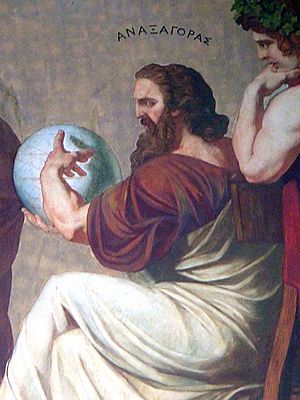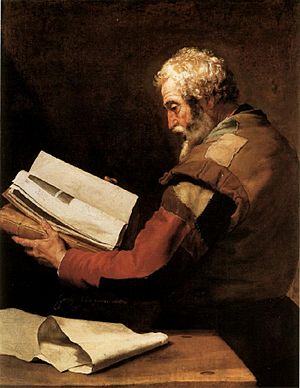Anaxagoras facts for kids
Quick facts for kids
Anaxagoras
|
|
|---|---|

Anaxagoras; part of a fresco in the portico of the National University of Athens.
|
|
| Born | c. 500 BC |
| Died | c. 428 BC |
| Era | Ancient philosophy |
| Region | Western philosophy |
| School | Ionian school |
|
Main interests
|
Natural philosophy |
|
Notable ideas
|
Nous, or Mind ordering all things |
|
Influences
|
|
Anaxagoras (/ˌænækˈsæɡərəs/; Greek: Ἀναξαγόρας, Anaxagóras, "lord of the assembly"; c. 500 – c. 428 BC) was an important Greek philosopher who lived before Socrates. He was born in Clazomenae, a city that was part of the Persian Empire at the time. Later, Anaxagoras moved to Athens, a major city in Greece.

Anaxagoras is famous for introducing the idea of Nous, which means "Cosmic Mind." He believed this Mind was a powerful force that brought order to the universe. He also had many interesting scientific ideas about nature. For example, he thought that life might exist all over the universe, a concept called panspermia. He correctly explained why eclipses happen and believed the Sun was a huge, fiery rock, much bigger than the Peloponnese region in Greece. He also tried to explain rainbows and meteors.
Who Was Anaxagoras?
Anaxagoras was born in Clazomenae around 500 BCE. He might have come from a wealthy family. He moved to Athens sometime after the Persian War, perhaps around 456 BCE. In Athens, he became good friends with Pericles, a very important leader.
Later in his life, Anaxagoras faced some challenges in Athens. People disagreed with his scientific ideas, especially his views on the Sun and Moon. Because of these disagreements and his friendship with Pericles, he had to leave Athens. He moved to Lampsacus, another city, around 434-433 BCE. He passed away there around 428 BCE. The people of Lampsacus respected him greatly. They even built a special altar to honor his ideas of Mind and Truth. They also remembered the day he died for many years.
What Were Anaxagoras's Main Ideas?
Anaxagoras had unique ideas about how the world works. He believed that everything is made up of tiny, unchanging pieces. These pieces are mixed together in different ways. What something is depends on which tiny pieces are most common in it. For example, a tree has more "tree-like" pieces, but it also has tiny bits of everything else.
The Cosmic Mind (Nous)
Anaxagoras introduced the idea of Nous, or the "Cosmic Mind." He thought that at the very beginning, everything in the universe was mixed up in a big, confused mess. The Cosmic Mind was a pure, powerful force that started to move and separate these tiny pieces. It organized the universe, creating the distinct things we see today.
This Mind was not limited like humans. It had all knowledge and power. It was the force that brought order out of chaos. Even though things are now separated, Anaxagoras believed that every single thing still contains tiny parts of everything else. This is why things can change and grow – it's just a new way of mixing and separating these tiny pieces.
His Ideas About Space and the Sky
Anaxagoras was very interested in the sky and space. He was one of the first to correctly explain eclipses. He said that the Sun was a huge, hot rock, even bigger than the Peloponnese region in Greece. He also believed that the Moon was made of earth, just like our planet, and that it had mountains. He even thought the Moon might have living things on it!
He also suggested that the stars were fiery stones that had broken off from Earth and were set on fire by spinning very fast. He thought the Earth was flat and floated on strong air. He even predicted that if a heavenly body broke loose, it could fall to Earth. People believe he predicted a famous meteorite fall in 467 BCE.
Anaxagoras also came up with the idea of panspermia. This is the thought that life might exist throughout the universe and could spread from one place to another.
Anaxagoras and Math
Anaxagoras was also interested in Mathematics. He was the first Greek thinker to try to solve the problem of squaring the circle. This is a very old and difficult math problem that involves trying to draw a square with the same area as a given circle, using only a compass and straightedge. He worked on this problem even when he was facing difficulties.
Anaxagoras's Impact
Anaxagoras wrote a book about his philosophy. Sadly, only small parts of it have survived today, thanks to another writer named Simplicius of Cilicia who saved them.
His ideas were known to famous Greek writers like Sophocles and Euripides. Even Socrates, another very famous philosopher, read Anaxagoras's books when he was young. Socrates mentioned Anaxagoras in his own trial, showing how important Anaxagoras's ideas were at the time.
Anaxagoras's ideas continued to influence thinkers much later. For example, the Italian poet Dante Alighieri mentioned him in his famous work, Divine Comedy. Also, the German writer Johann Wolfgang von Goethe included Anaxagoras as a character in his play Faust, Part II.
See also
 In Spanish: Anaxágoras para niños
In Spanish: Anaxágoras para niños
- Anaxagoras (crater) on the Moon
 | DeHart Hubbard |
 | Wilma Rudolph |
 | Jesse Owens |
 | Jackie Joyner-Kersee |
 | Major Taylor |

